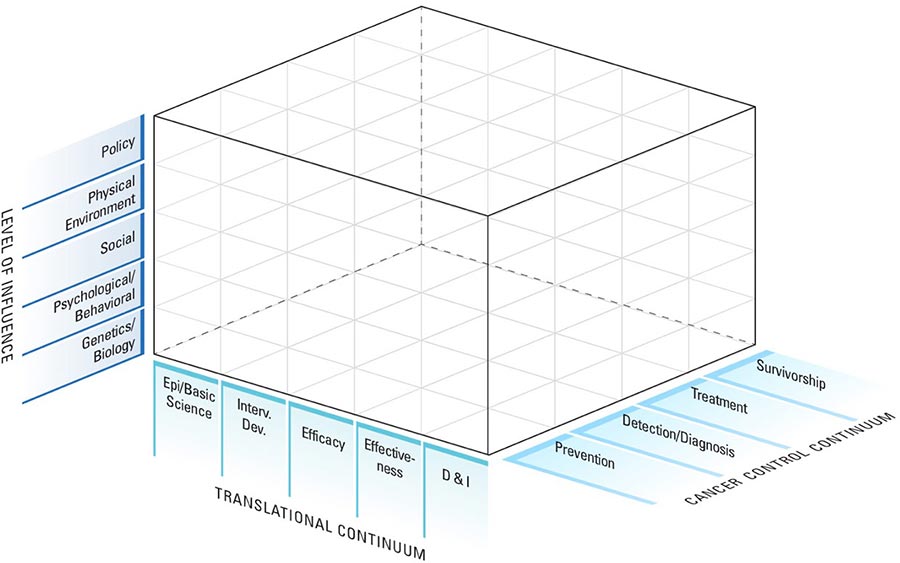Vision
A world in which individuals, families, and communities engage in healthy lifestyle behaviors to prevent cancer, improve treatment outcomes, extend life, and optimize health and well-being.
Mission
To support and catalyze research on the discovery, development, testing, and implementation of effective strategies to promote healthy lifestyle behaviors for cancer prevention and control.
Purpose
The Branch aims to support research at multiple levels of analysis to improve cancer-related health behaviors and risk factors.
Levels of Analysis
Biological, psychological, behavioral, social, environmental, sociocultural, and system levels, individually and in combination.
Behavioral Risk Factors
Behavior genetics, diet, physical activity and sedentary behavior, energy balance, obesity, sun safety and tanning, alcohol use, sleep and circadian dysfunction, adherence to cancer-related medical and behavioral regimens, and other emerging cancer risk behaviors.
Scientific Priorities
HBRB synthesizes and disseminates findings, recommendations, and priorities of successful strategies in prevention and behavioral change interventions; and solicits input from the extramural community to refine methodology and evaluate effectiveness.
- Plans, develops, and coordinates research on lifestyle behaviors and cancer prevention. This includes diet, physical activity, sedentary behaviors, sleep, genetic determinants of diet, weight and physical activity behaviors, the interactions between behaviors, genes, obesity and the environment, virus exposure, sun safety, and skin cancer prevention.
- Provides leadership in developing methodologies for improved empirical study of cancer-relevant behaviors (e.g., diet, physical activity, energy balance, sun safety, environmental exposures) and the psychosocial and built environment correlates of these such as measures of psychosocial correlates of eating patterns and physical activity and of the obesogenic environment along with food consumption and dietary related biomarkers and the interaction between the environment and psychosocial factors associated with cancer preventive health behaviors.
- Plans, develops and coordinates research focused on effective strategies to reach population sub-groups at greater risk for certain cancers.
- Develops and supports evaluation of which strategies are most effective within clinical intervention studies and community-based interventions and the development of effective environmental and organizational-based interventions.
- Solicits input and communicates regularly with the extramural community to refine methodology and evaluate effectiveness.
- Plans, administers, and evaluates demonstration project research, including diffusion and dissemination of successful strategies in prevention behavioral change interventions.
- Sponsors workshops, symposia and other means of disseminating research findings.
- Plans and participates in training programs to advance behavioral health research.
- Synthesizes and disseminates findings, recommendations and priorities to target organizations and individuals.


 Read our Health Behaviors Research Branch 2018-2022 Strategic Plan and send us your feedback
Read our Health Behaviors Research Branch 2018-2022 Strategic Plan and send us your feedback